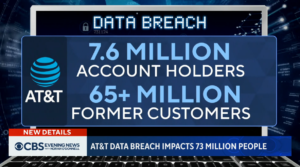Table of contents:
In March 2024, the AT&T data breach was disclosed, impacting 73 million present and past users. Their complete names, email addresses, phone numbers, Social Security numbers, and AT&T account details were compromised. The leaked data seems to originate from 2019 or earlier. AT&T has taken steps by resetting passcodes for affected individuals and extending identity theft protection and credit monitoring services. Notably, the data was made available on the clear web, widening its accessibility to numerous individuals. To safeguard personal information, experts advocate for employing multi-factor authentication, avoiding password reuse, investing in identity protection measures, freezing credit reports, and enrolling in round-the-clock credit monitoring services.
How many people were impacted by the AT&T data breach?
AT&T said the breach on Saturday affects about 7.6 million current and 65.4 million former AT&T customers.
Source: CBS News
What’s the best way to protect my personal information?
To protect yourself from potential identity theft following the AT&T data breach, there are several steps you can take:
- Monitor your financial accounts: Regularly check your bank and credit card statements for any unauthorized transactions.
- Freeze your credit: Consider placing a freeze on your credit reports with the three major credit bureaus (Equifax, Experian, and TransUnion) to prevent anyone from opening new accounts in your name.
- Set up fraud alerts: You can also set up fraud alerts with the credit bureaus to notify you of any suspicious activity. Leveraging the resources provided by the Federal Trade Commission (FTC), consider implementing free credit freezes and fraud alerts.
- Be cautious with personal information: Limit the amount of personal information you share online and over the phone, and be wary of phishing scams.
- Use strong passwords: Immediately alter your passwords and closely monitor your account for any unusual or unauthorized transactions. Use unique and complex passwords for all your accounts, and consider using a password manager to keep track of them.
- Consider identity theft protection: You may want to consider signing up for an identity theft protection service, which can monitor your credit reports and personal information for any suspicious activity.
- Stay informed: Keep up to date with the latest news and information about the data breach, and follow any instructions or guidance provided by AT&T.
By taking these steps, you can help protect yourself from potential identity theft and minimize the risk of any negative consequences.


